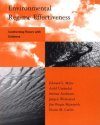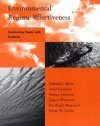Out of Print
By: Edward L Miles(Author), Arild Underdal(Author), Steinar Andresen(Author), Jørgen Wettestad(Author), Jon Birger Skjærseth(Author), Elaine M Carlin(Author)
508 pages, illustrations, tables
![Environmental Regime Effectiveness Environmental Regime Effectiveness]()
Click to have a closer look
About this book
Biography
Related titles
About this book
Environmental Regime Effectiveness examines why some international environmental regimes succeed while others fail. Confronting theory with evidence, and combining qualitative and quantitative analysis, it compares fourteen case studies of international regimes. It considers what effectiveness in a regime would look like, what factors might contribute to effectiveness, and how to measure the variables. It determines that environmental regimes actually do better than the collective model of Environmental Regime Effectiveness predicts.
The effective regimes examined involve the End of Dumping in the North Sea, Sea Dumping of Low-Level Radioactive Waste, Management of Tuna Fisheries in the Pacific, and the Vienna Convention and Montreal Protocol on Ozone Layer Depletion. Mixed-performance regimes include Land-Based Pollution Control in the North Sea, the Convention on Long-Range Transboundary Air Pollution, Satellite Telecommunication, and Management of High Seas Salmon in the North Pacific. Ineffective regimes are the Mediterranean Action Plan, Oil Pollution from Ships at Sea, International Trade in Endangered Species, the International Whaling Commission, and the Convention for the Conservation of Antarctic Marine Living Resources.
Customer Reviews
Biography
Edward L. Miles is Virginia and Prentice Bloedel Professor of Marine and Public Affairs at the University of Washington. Steinar Andresen is a Senior Research Fellow at the Fridtjof Nansen Institute in Norway. Elaine M. Carlin is a Research Scientist with the Joint US/Norwegian Research Team in the School of Marine Affairs at the University of Washington. Arild Underdal is Professor of Political Science at the University of Oslo.
Out of Print
By: Edward L Miles(Author), Arild Underdal(Author), Steinar Andresen(Author), Jørgen Wettestad(Author), Jon Birger Skjærseth(Author), Elaine M Carlin(Author)
508 pages, illustrations, tables
"This book is quite an achievement. There is no other work in the international relations field that does such an extensive job of assessing the effectiveness of international environmental agreements."
– Miranda A. Schreurs, Department of Government and Politics, University of Maryland
"If the right people employ appropriate tools, the most malignant problems can be solved effectively. In demonstrating this most convincingly for international environmental regimes, the authors have at the same time mastered one of the most difficult methodological tasks in our discipline. This book is the most sound and fascinating account of international regime consequences that I know."
– Michael Zuern, Professor for Transnational and International Relations, University of Bremen, and Director of the Institute for Intercultural and International Studies
"The authors have produced a volume that has three core merits: First, its findings strengthen confidence in the effectiveness of international regimes; secondly, it demonstrates the usefulness of rigorous theory-led research based on comparative case studies; and thirdly, it excels in critical methodological self-reflection indicating clearly the reach and limits of its findings' validity. I am truly impressed by the authors' achievement in this volume."
– Volker Rittberger, Institute of Political Science, Center for International Relations, University of Tübingen, Germany
"This important book breaks new ground in the study of international institutions and develops arguments that will undoubtedly stimulate additional research."
– Oran R. Young, Professor of Environmental Studies, Dartmouth College






































